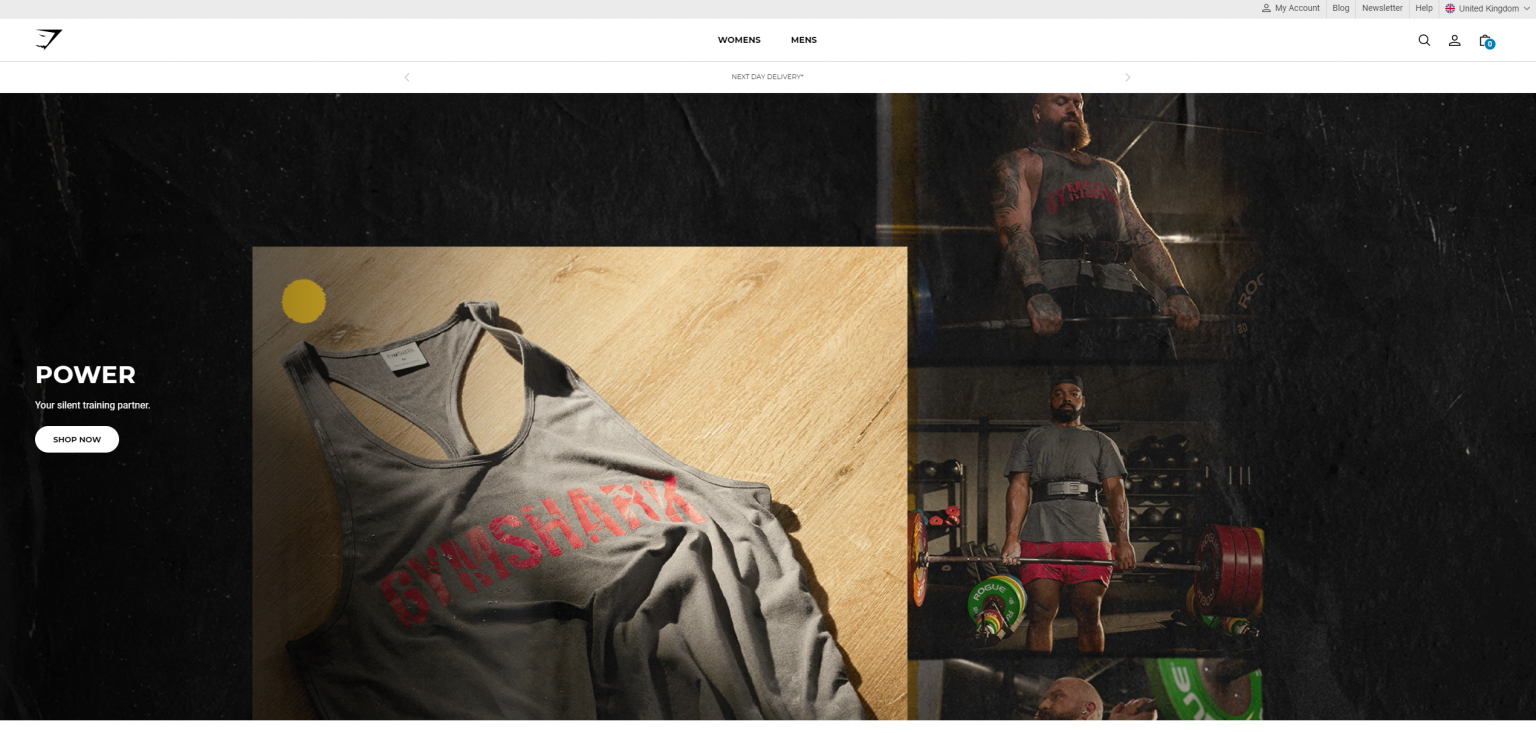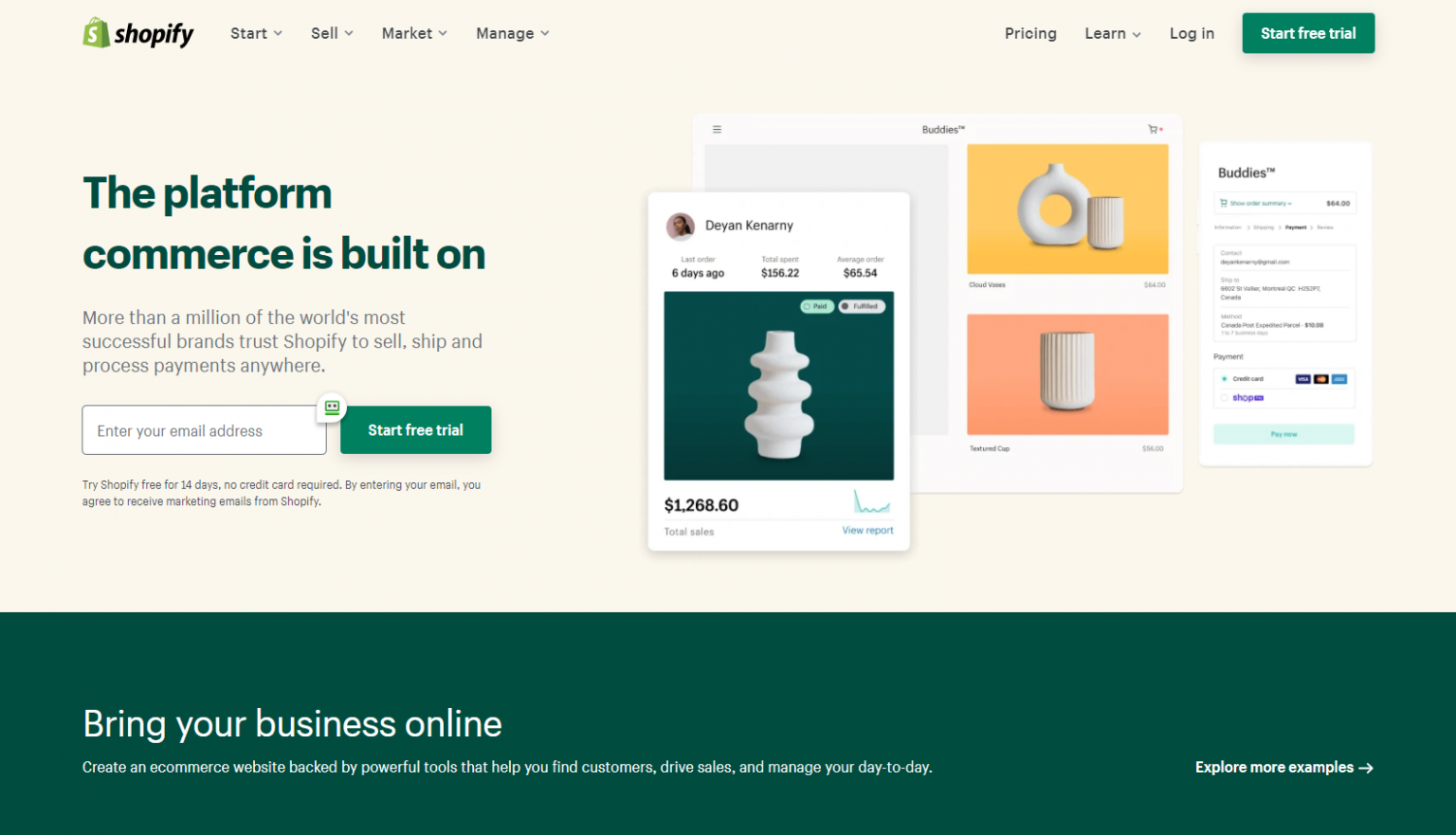If you’re just launching your business online or your business has outgrown your old website, you will need to start your journey by choosing which ecommerce website platform to use.
Different platforms offer various features and benefits for the many sizes and requirements of each ecommerce business and it’s important to note the advantages and disadvantages of each platform, based on the unique specifications of your site. This guide will help to give you an overview of which platforms are available for businesses and which may be more suitable for your business.
What Is An Ecommerce Website Platform?
An ecommerce website platform is what an ecommerce website is built using. It is the software behind the website, which manages products, pages, checkout, payments, sales, and logistics.
Using an ecommerce platform is the alternative to building a website from nothing, which takes time, resources, and a multimillion-pound budget.
The Biggest Platforms For Ecommerce Websites
When it comes to choosing which platform to base your ecommerce website on, there are 3 main providers to consider.
Magento

Magento is one of the biggest ecommerce platforms in the world. It is used by more than 170’000 global brands, including Nike, Nespresso, and Land Rover.
It offers a variety of features for ecommerce businesses, including easy cross-selling, payment gateway integrations, and extensions for customisation. Magento also offers a good solution when it comes to managing products as it can store up to 250’000 products.
However, Magento is not for beginners. You will need specialist developers to build and maintain your websites, which may mean that Magento is not a viable solution for smaller businesses.
Shopify

Shopify is another leader when it comes to ecommerce platforms. It is used by more than 400’000 brands, including Gymshark, Penguin Books, and Fitbit.
Unlike Magento, Shopify is easy for beginners to use and customise. Much of Shopify is based on drag and drop features making it easy to customise and build your store. It has a simple interface that allows you to generate promo codes, manage products, create blogs, integrate social accounts, and email customers.
However, the features and level of customisation that you can do with Shopify is limited. Without a developer, you will need to use preset themes to design your website, which will limit how your site looks and feels.
Woocommerce

Woocommerce is an alternative ecommerce platform. It is a free plugin for WordPress that is used by over 3 million websites including Weber, Stroopwafels, and AeroPress.
It offers flexibility and ease of management for smaller businesses that don’t have access to a developer. In Woocommerce you can configure your store, list products, bulk email, manage multiple inventories, and monitor analytics as a beginner.
However, many features in Woocommerce are available using additional plug-ins, which can become expensive and also slow your site down. So it is important to be mindful of how many plugins that you install.
The Difference Between SaaS, PaaS and IaaS
However, it can get a little more complicated than that. Not only are there different platforms to consider, there are also different types of platforms.
It is important to understand the different types of platforms and how each could benefit your business. There are different types of platforms depending on how each uses the cloud to host a website. These types are categorised into three acronyms.
SaaS
This stands for Software As A Service. It refers to the use of software that is already available for use via a third party over the internet. This includes services such as MailChimp, Slack and Zendesk are good examples of SaaS
PaaS
This stands for Platform As A Service and means that a third-party provider is responsible for providing both the hardware and software solution This doesn’t mean that a PaaS would replace the entire IT infrastructure of a business, but would mean that the core elements of the website would be held on a third-party platform. Examples of PaaS would be sites such as Google App Engine, OpenShift, Windows Azure, etc.
IaaS
This stands for Infrastructure As A Service, which uses Pay As You Go services via the internet. This includes storage or Networking like Amazon Web Services, Google Compute Engine, etc.
How To Choose The Best Ecommerce Platform For Your Brand
All platforms have their advantages and disadvantages. The best ecommerce platform for your brand will largely depend on how your business operates, how big your company is, and what features you are looking for from the platform you choose.
Which Is The Best Ecommerce Platform For A Quick Setup?

Shopify has become the number one website platform for those who are looking for a quick setup and/or those who have a beginner-level skill set in relation to creating and running an ecommerce store.
Shopify has a user-friendly interface and drag-and-drop options to customise the look and feel of your site. However, it may not be the most suitable choice depending on your business. Here are the pros and cons of using Shopify as the best platform for beginners.
Pros:
- Perfect for Beginners
- No need to pay for additional hosting, as this is a Cloud-based platform
- There are multiple different built-in features and extras which are available in the Shopify App Store
- Shopify support over 70 payment gateways that it supports, including PayPal and Amazon Payments
- It’s cheap to have a basic account. A Basic Shopify Plan starts at only $29 and increases up to $2,000 per month for larger sites
Cons:
- There are added costs when it comes to integrating third-party solutions, which can often be a shock if this isn’t something a business planned for or were aware of before building the website
- Whilst Shopify is cheap, it isn’t the most affordable solution in the market, but if compared to other platforms which take a larger fee based on the quantity of sales, using Shopify will ensure that fees remain flat regardless of the amount of revenue being generated
- Although the customisation options are user-friendly, you are limited to certain looks and feels unless you hire a developer
Which Is The Best Ecommerce Platform For Adding To An Existing WordPress Site?

Created by WordPress Developers, WooCommerce has been designed with existing WordPress sites in mind.
Woocommerce is free-to-use, open software, which is useful for smaller businesses. However, you will need to pay for hosting and you may need to pay for additional plugins. Here are the pros and cons of using Woocommerce with an existing WordPress site.
Pros:
- WooCommerce allows simple product listing, bulk emails, and multiple store inventories
- It offers built-in analytics and marketing features, along with lots of flexible configuration tools
- Multiple different payment gateway options to choose from
- Good level of built-in SEO features
Cons:
- Many extensions can only be accessed if they are paid for, which can add a layer of cost to website development that wasn’t expected by a business
- If multiple extensions and features are added, this can slow down the performance of a website and cause issues
Which Is The Best Ecommerce Platform For Large Businesses?

BigCommerce has the great feature of being the only engine that directly integrates with the Google Merchant Center, which allows businesses to promote their products on Google Shopping. BigCommerce is perfect for large businesses as it is easy to use but also, is capable of handling vast amounts of data, along with having the ability to integrate with one of the largest shopping platforms in the world.
Pros:
- BigCommerce offers an official Mailchimp integration
- There are 4 pricing plans available, which will suit an expanding business from launch right up to being a fully-fledged, profitable large business
- BigCommerce has a strong out-of-the-box payment gateway option in the form of Paypal, this is great for getting started and also allows businesses to add the payment gateways that they require at a later date. Having PayPal as an out-of-the-box option provides a layer of security for a business, which is a significant plus point
Cons:
- Unfortunately, BigCommerce is not as customizable as some other platforms, such as Magento and this can be quite limiting to businesses if they are requiring more elaborate themes or additions to their website
- The cost of using the platform is directly related to the number of sales that happen through the website and so it is quite difficult for a business to calculate and predict the cost of using BigCommerce on an ongoing basis
Which Is The Best Ecommerce Platform For Businesses With Multiple Storefronts?

Magento is often considered the best multi-channel ecommerce platform, as it allows for large inventories, product management, and multiple stores.
Magento is fast and user friendly, with the ability to be customized and modified to suit specific requirements. However, it can become expensive for beginners and small businesses as you will likely need to hire a developer to set your store up and customise it. Here are the pros and cons of using Magento to manage multiple store points.
Pros:
- There are 3 hosting options that are unique to the Magento platform. These options are a created solution that can be hosted on-site, in the Cloud, or on a third-party hosting site
- Multiple different SEO features
- Wide variety of payment gateways available, with Magento readily supporting PayPal, Authorize.net, Amazon Payments, Stripe, Klarna, and many more
- A Magento-based ecommerce store can be easily increased to store up to 250K product lines
Cons:
- One of the main purposes of Magento is that it can be used to create non-templated websites along with custom solutions for each business. This doesn’t necessarily lend itself to being a platform for the use of beginners or businesses who can’t invest the budget required to recruit specific Magento developers.
- Hiring those developers can take a lot of time and budget to recruit skilled developers
- A strong budget for creating and developing websites using Magento is necessary, as some Magento projects start at $20,000 and so can be unaffordable for new and smaller businesses
Summary
Whether you are migrating an existing website, starting a brand new site, or launching your brick-and-mortar store online, the ecommerce software you choose for your business can have an impact on how successful it is online.
You should carefully consider what features your site will need, what budget you have, how you will maintain it, and what resources you have to build your site. From there, you can start identifying what platforms have the potential for your site. If you’re a beginner, consider a Shopify store that is easy to use and maintain. Or if you want something more bespoke and have the budget to spend consider using Magento.
We are Magento and WooCommerce developers, our team at Sellerdeck can help to set up, build, and maintain your ecommerce website. Contact us to find out more.